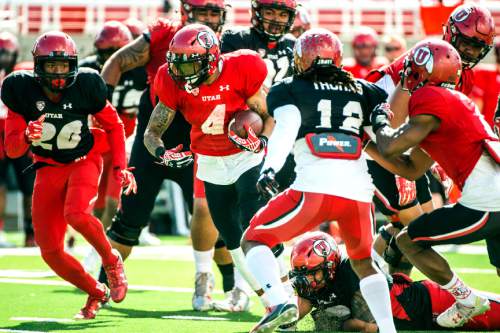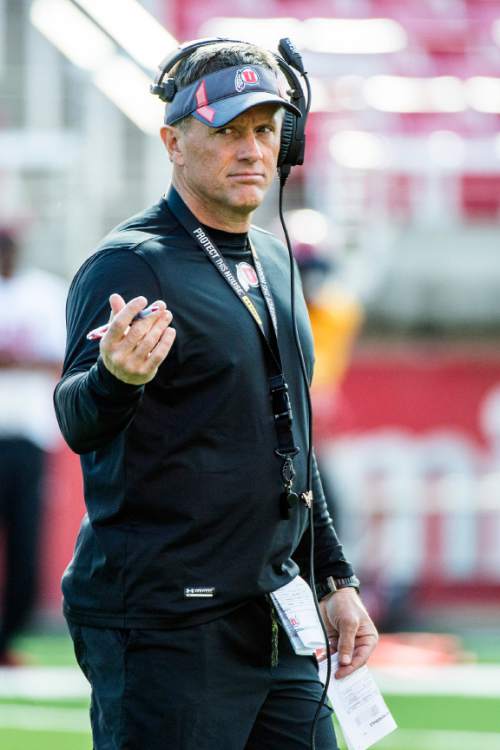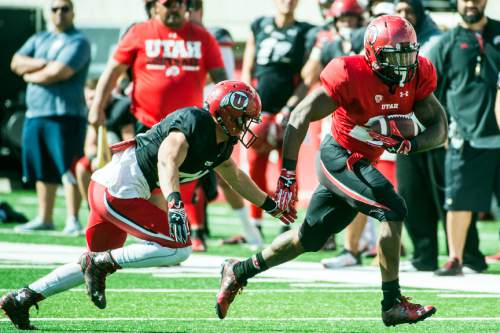This is an archived article that was published on sltrib.com in 2016, and information in the article may be outdated. It is provided only for personal research purposes and may not be reprinted.
Of all the coaches with soundbites about the NCAA banning satellite camps, http://www.foxsports.com/college-football/story/david-shaw-s-comments-about-satellite-camps-weren-t-a-shot-at-the-sec-stanford-041216";>Stanford's David Shaw might've been the most provocative.
"It doesn't make sense for us to go hold a camp some place where there might be one person in the entire state that's eligible to get into Stanford," he said.
While the quote itself smacks of elitism on its face, there's a deeper truth to what he said, and it reflects an attitude of many programs approaching an era without satellite camps — not just ones that are as prestigious academically as Stanford.
Last year, the Utes held six camps: two in Texas and four in California. While both states have been rich on the recruiting trail for them, they held six not necessarily to see everyone they could see, but for a much simpler reason: Everyone else was doing it.
College football has become a giant arms race, with schools building multi-million dollar facilities and adding new staff positions seemingly every year. If one school comes up with some edge, the other schools are pressured to keep up.
Utah tight ends coach Fred Whittingham — who played a large role in organizing Utah's camps the last few seasons — said http://bit.ly/1Nf58H1";>that the camps had been helpful with recruiting, but internally, the Utes were reviewing how effective a method it was to host half a dozen camps to get perhaps half a dozen commitments out of those crowds.
"The reality is it's become so proliferated and so saturated, it's hard to judge just how effective a satellite camp is for Utah," he said. "Our national draw isn't as great as Michigan or Ohio State, which have been getting all the attention. So even this past year, we were questioning whether we were getting a return on our investment."
Even the big schools don't get a flood of commitments from camps. The vast majority of attendees of a 500-person camp, as Shaw alluded, probably aren't good enough to play for Michigan or Ohio State. Other campers may not qualify academically.
That's not to say camps are without value. The Utes have discovered certain prospects they might not otherwise have found, and some campers have built relationships with the Utah staff that might not have otherwise existed. Hosting a camp in California, for example, does promote Utah's brand and gets out-of-state kids thinking about Utah as an option earlier in the recruiting process.
The criticism of the decision's effect on recruits from low-income families is particular biting: Now recruits who may have interest in Utah have to hoof it on their own dime to come up to the school to participate in camps.
Still, the ban isn't without its merits: There were so many camps, Whittingham said, it turned into another demanding month in June after the spring evaluation period ended.
"I don't know what to think of it philosophically, as in was it the right decision," he said. "But schools were compelled to do it because everyone else was doing it. Even Michigan which got all the publicity last summer for doing those camps only got a few commits from it."
Other stories from around the conference and the NCAA:
• Devontae Booker held a personal Pro Day at Grant High in Sacramento on Tuesday morning. http://www.nfl.com/news/story/0ap3000000652278/article/rb-coaches-from-two-teams-attend-bookers-personal-pro-day?campaign=tw-cf-sf24214923-sf24214923";>NFL.com reported that 18 teams were present as Booker ran through several position drills to showcase his skill set. But his torn meniscus, which was surgically repaired in February, seems to be a lingering issue: Booker didn't do other field drills because he's still not fully healthy. From the NFL Combine, Booker hoped to be healthy by Utah's Pro Day. From Utah's Pro Day, he hoped to be healthy for his personal Pro Day. Now, he's still not 100 percent. Several media outlets have reported that Booker's knee is a major concern for NFL teams, and the shifting timeline of his return seems to justify that worry so far.
• More from the Division I Council: http://www.cbssports.com/collegefootball/writer/jon-solomon/25550361/ncaa-bans-creation-of-new-bowl-games-for-next-three-years";>There's a three-year moratorium on new bowl gameshttp://www.cbssports.com/collegefootball/writer/jon-solomon/25550361/ncaa-bans-creation-of-new-bowl-games-for-next-three-years";>, which will hopefully prevent situations like three 5-7 teams reaching the postseason last year. After two Mountain West teams ended up playing one another in Arizona Bowl (Nevada vs. Colorado State), commissioner Craig Thompson called the system "broken." Bowls have been popping up almost as much as satellite camps to cash in on sizable TV contracts. While the decision stops the bowl proliferation that most seemed to agree was out of control, maybe Utah fans would prefer other options rather than run the risk of going to a third straight Las Vegas Bowl.
• Kind of a weird story out of Corvallis, where https://www.oregonlive.com/beavers/index.ssf/2016/04/seth_collins_to_return_to_oreg.html";>QB-turned-WR Seth Collins has decided to stick at Oregon Statehttps://www.oregonlive.com/beavers/index.ssf/2016/04/seth_collins_to_return_to_oreg.html";> after committing to transfer to Northern Illinois earlier in the year. The story is not as interesting for its effect on Pac-12 sports as for the odd dynamic of Collins' return. Said Gary Andersen in a statement, from The Oregonian: "We have a plan that will take place over the next few months for Seth to earn his way back in the mainstream of our program. He is fully prepared to accept the responsibility and make up for the time he has missed." Sounds like he's thrilled.
• http://www.maxpreps.com/news/KToJNBYbn0WHXlLOtysEiA/2015-16-maxpreps-boys-basketball-all-american-team.htm";>Maxpreps released its high school All American listhttp://www.maxpreps.com/news/KToJNBYbn0WHXlLOtysEiA/2015-16-maxpreps-boys-basketball-all-american-team.htm";>, which including locals Frank Jackson (Duke) and Yoeli Childs (BYU). But just as telling are the players who are coming into the Pac-12: The player of the year was UCLA signee Lonzo Ball, while the Bruins' TJ Leaf was a second-teamer. Second-teamer Payton Pritchard is signed with Oregon. Third-teamer Markelle Fultz is signed with Washington, while fifth-teamer Kobi Simmons is headed to Arizona. Four of those players are guards, so potentially the conference adds a lot of dynamic playmakers in the backcourt next winter.
kgoon@sltrib.com
Twitter: @kylegoon







